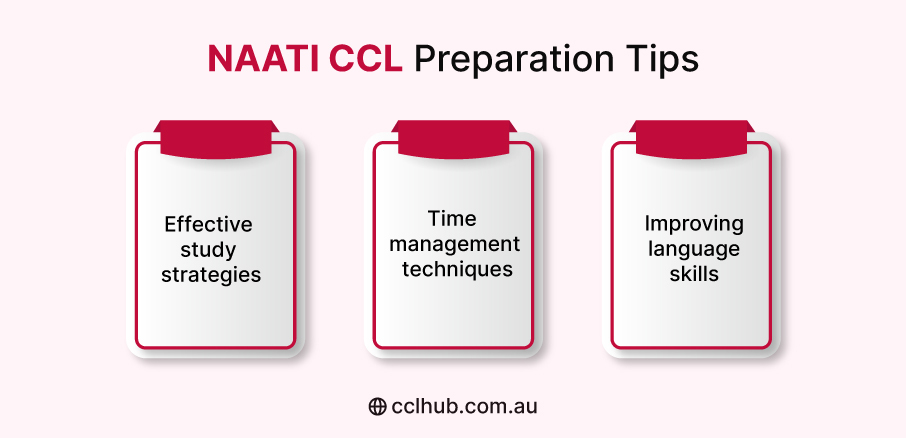
Unlocking the Power of NAATI CCL: A Comprehensive Guide
Searching for the best guide for NAATI CCL preparation? You are at the right place. Whether you are looking for improving your language proficiency or aiming for a high score, this guide will help you to acquire the knowledge and resources that are required for the NAATI CCL test.
Understanding NAATI CCL
Introduction to NAATI CCL
The full form of NAATI CCL is the National Accreditation Authority for Translators and Interpreters Community Credentials. This test is conducted to assess the language skills of interpreters and translators in Australia.
Importance of NAATI CCL in Australia
NAATI CCL is very important for immigration purposes as well as for those who are searching for employment opportunities in translation and interpreting fields in Australia.
CCL Test Structure
Test Structure
In the Online CCL Test, you have to turn on a recording to translate and explain it. The recording has two conversations: one between an English speaker and someone who speaks another language (LOTE). Your response will be recorded to score your NAATI CCL test.
Each conversation in the test is around 300 words long, split evenly between English and the chosen other language (LOTE). These dialogues are then broken into smaller parts, with each part being no more than 35 words.
-
- The maximum time allotted for the test is 20 minutes.
- NAATI sends the result via mail within 4-6 weeks from the test date.
- Understanding these parts helps you know what to expect and how to prepare for each part of the test.
Time allocation for each section
This point tells you how long you can spend on each part of the test. It’s similar to planning your day so you can finish everything on time without feeling stressed.
In the NAATI CCL test, there are two parts: Dialogue Interpreting and Monologue. For the Dialogue Interpreting part, you have 20 minutes to interpret six conversations. In the Monologue part, you have 15 minutes to interpret two speeches.
Knowing the time limits helps you manage your time wisely during the exam, so you can answer all the questions without rushing.
Editor’s Choice: One day refresher before your NAATI CCL exam.💡💡
NAATI CCL Languages
Available languages for the CCL test
There are various languages available for the CCL test. NAATI CCL conducts tests on various languages such as Nepali, Hindi, Punjabi, Tamil, Spanish, etc. Please make sure that you choose the language you are confident with.
Choosing the right language for your test
You have to keep in mind that you choose a language you are really good at. Take time to think about the language you speak best that you learned in schools and in everyday conversation.
Importance of language proficiency
It is very important to be an expert in the language you chose for the CCL test. You have to practice a lot when speaking and listening to the language you chose. You also try to talk with people who speak more fluently so that you can prepare well for the test.
NAATI Study Resources
Online tutorials and courses
You can find various websites and online platforms that provide the required tutorials and courses for helping you prepare for the CCL exam. You can find interactive and informative videos, PDFs, and practice exercises to improve your learning experience.
You can find CCL tutorials and other NAATI courses related to it on our website at an affordable price. 🔔🤗🤗
Practice tests and mock exams
You can find different practice tests and mock tests in the given course to help you with the test structure. You will learn the types of questions that will come on the test day. The mock tests are very essential because you can assess your progress from time to time and improve the weak parts.
NAATI CCL Preparation Tips

Effective study strategies
Practice regularly with the study materials, breaking down into easier-to-handle parts. Try using tools like flashcards or memory tricks to help you remember things better.
Time management techniques
Make a daily routine with the study schedule and create different time slots for different chapters or parts of the topics. Try not to skip any days to make most out of your study time.
Improving language skills
There are other ways that could improve your language skills such as watching TV shows, listening to music, podcasts, reading books, and novels, and if possible making a conversation with native speakers. Besides, you can seek feedback for your language use and where you could improve from the tutors or from the course itself.
Also Read: 8 Tips to Pass the NAATI CCL Exam on the First Attempt.🤗🤗
NAATI Test Day Tips
Preparing for the test day
Ensure that you know the exact time and venue of your test before the test day. Take all the necessary belongings, like your ID documents, water, during the test day. Take a deep night’s sleep to keep your brain fresh and body energetic for the exam day.
Do’s and don’ts during the exam
You should arrive at the test centre on time to avoid the rush and stress. Listen to all the instructions clearly announced by the test supervisor. Don’t forget to listen attentively and speak clearly during the test. Stay very focused throughout the exam.
Managing test anxiety
Try to stay relaxed and calm although everyone feels nervous before the exam. Take a deep breath and remind yourself that you have prepared very well for this. Stay optimistic with the visualization of succeeding. If you still feel nervous, take some time to relax and refocus before continuing with the test.
NAATI Results and Feedback
Receiving feedback from NAATI
After you get your results, NAATI may give you feedbacks on your exam performance. They will highlight the areas where you did well and where you need improvement. The feedback provided by NAATI can be valuable for your future preparation.
Next steps after receiving results
If you are pass, then, great job. You can move further with whatever you need to do next. If you don’t pass, don’t panic. NAATI will tell you what you can do better, so you can get ready to try again.
Conclusion
Passing a NAATI CCL test is not just conquering it but also opening the door towards the new opportunities. Know about the test format well, select your best language and use study materials wisely. Practice regularly and manage your time wisely to boost your chances. On test day, stay calm, follow instructions, and deal with any nerves calmly. Whether you pass or not, NAATI’s feedback will help you improve for next time. So, stay positive, keep learning, and aim high!
By following the tips and strategies outlined in this guide, you’ll be well-prepared to tackle the CCL test with confidence. Remember, consistent practice and dedication are key to success. Good luck on your NAATI CCL journey!
FAQs
What is NAATI CCL?
NAATI CCL stands for National Accreditation Authority for Translators and Interpreters Community Credentials. It’s a test designed to assess language skills for interpreters and translators in Australia.
Why is NAATI CCL important?
NAATI CCL is crucial for immigration purposes and for those seeking employment opportunities in translation and interpreting fields in Australia. It serves as a validation of language proficiency.
How is the CCL test structured?
The test consists of dialogue and monologue sections, with specific time allocations for each. Understanding the test structure is essential for effective preparation.
What languages are available for the CCL test?
NAATI CCL offers tests in various languages such as Nepali, Hindi, Punjabi, Tamil, Spanish, and more. Test-takers should choose a language they are proficient in.
What study resources are available for NAATI preparation?
There are online tutorials, courses, practice tests, and mock exams available to help prepare for the NAATI CCL test. These resources provide interactive learning experiences and familiarize test-takers with the test format.
How can I improve my language skills for the NAATI CCL test?
Apart from formal study materials, improving language skills can involve activities like watching TV shows, listening to music or podcasts, reading books, and engaging in conversations with native speakers.



